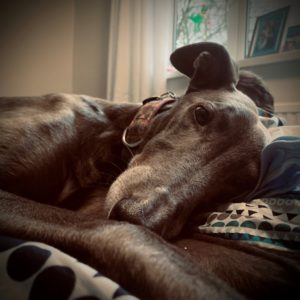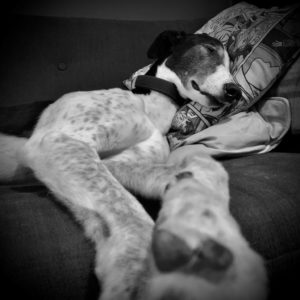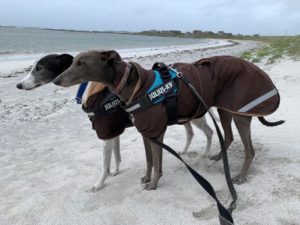 1. What is your role within the History department?
1. What is your role within the History department?
I am Professor of Cultural History and Head of Department.
2. What are your research interests?
I work on the cultural history of 20th century Britain, with particular interests in gender, sexualities, and selfhood, and the significance of the 1920s and 1930s. Increasingly my focus is on the politics of cultural life, and the politics of practice of writing cultural history in the here and now.
3. Where did you study (UG, PGT, PGR etc.)?
I went to Cambridge as an undergraduate, then escaped to the University of Essex to do my PhD.
4. Did you always know you wanted to go to university or in to academia?
Definitely not – I didn’t really know it was an option. My family are from a mining town in South Yorkshire and I grew up in Scunthorpe. Although there was a strong autodidactic tradition among my grandparents, and my mum and dad went to grammar school and college, I was the first person in my family to go to university. To be honest, I’m not quite sure how I ended up here: I always enjoyed history, and just kept on going until I ended up with a PhD. There was a moment around 2002 when I realised where I’d ended up and thought seriously about doing something different, but in the end I’m still doing this. What really made a difference was some of the people who taught me at sixth form and university. It wasn’t so much that they inspired me – though they certainly did – but that they were interested in what I had to say, and took me seriously.
5. How long did it take and how did you manage to fund and complete your PhD?
Four and a half years, I think – I started off on a University of Essex PhD scholarship then got funding from the Arts and Humanities Research Board for two years. I taught all the way through my PhD as well.
6. What was your PhD on?
It was an embarrassing early version of my first book. The title says it all – A Sun Among Cities: Space, Identities, and Queer Male Practices, London 1918-57. The project grew out of things I studied as an undergraduate, but it was bound up with my personal and political journey in the mid- to late-1990s.
7. What are you working on at the moment?
I suspect this is not the most sensible thing I’ve ever done, but I’m juggling two book-length projects at the moment, both of which tease out questions around the politics and practice of cultural history.
Postal Pedagogies and Petty Capital: The Global Business of Self-Improvement traces the remarkable rise and fall of the Pelman Institute and the correspondence course known as Pelmanism. From the 1890s to the 1960s, tens of thousands of people across the world committed themselves to the task of “improving” their personality. Lured in by adverts promising social and professional success, they industriously read textbooks and completed worksheets — or, perhaps just as often, gave up on the course within days. The project follows the Pelman Institute and its members between its offices in Britain, France, India, South Africa, New Zealand, Australia, Canada, and the United States. In so doing I hope to explain why self-improvement became a global business, and how, in turn, Pelmanism disappeared from popular memory as anything other than a children’s card game. It is a book about the global movement of psychological knowledge, ideas of personhood, advertising techniques, and corporate capital. It is also an intimate history of what self-improvement meant to the ordinary men and women who signed up for the Pelman Institute’s courses — about the changing nature of aspiration and anxiety in the modern world.
Seven Dials: A Cultural History, by contrast, focuses tightly on a small area of central London. A notorious slum and cosmopolitan working-class neighbourhood, Seven Dials was apparently in a constant process of redevelopment between the construction of Shaftesbury Avenue in the 1880s and the high profile battles over its conservation and regeneration a century later. In exploring this history, my starting point is the furore around a small cafe in Great White Lion Street in the mid-1920s. Run by a Sierra Leonean man and his white British wife, the cafe is my prompt to explore how the encounters between metropolitan governance, corporate finance and property development, and diverse local actors shaped the transformation of urban society and culture. Placing Seven Dials’s history in its imperial and global context, and emphasising the relationship between culture and capital, the project moves across scales of analytic to consider the politics and prehistory of the process we now call gentrification.
8. What made you want to become a lecturer/academic?
I love teaching and, at least some of the time, I love the process of researching, thinking, and writing about the past. It seems increasingly old-fashioned to say this, but I believe in the value of education as a public good – something that’s essential in creating critical, engaged, and active citizens. That seems more important than ever these days. My mum and dad were both teachers so I grew up taking it for granted that teaching and education mattered.
9. Name three books/films/podcasts you recommend to read/watch/listen to during lockdown.
Two books that made me want to be a historian, shape the way I think, and remind me how far I have to go every time I re-read them. Vic Gatrell’s The Hanging Tree: Execution and the English People, 1770-1868 is an impassioned, passionate, ferociously critical history of the emotions. Deborah Cohen’s Family Secrets is about as good as social and cultural history can get – moving, ambitious, and compelling.
The most amazing book I read recently is Daegan Miller’s This Radical Land: A Natural History of American Dissent – it’s stunningly good, and has changed my sense of what historical writing might be.
10. What is the most historically inaccurate film or scene you have watched or read?
I don’t think historical accuracy is a relevant or useful way of thinking about a film or novel. When historians get grumpy about something being ‘inaccurate’ it tells us more about them than the film or novel they are talking about.
I wrote something about this – focusing on Peaky Blinders – for the Centre for Modern British Studies blog at https://mbsbham.wordpress.com/tag/peaky-blinders/.
11. Are you staying physically active during lockdown? If so, how, and do you suggest anything?
I was actually ill with Covid-19 for three and a half weeks and it’s taken me a lot longer to recover properly from that. In the normal scheme of things I’m a cyclist, and try to do around 100 miles a week. That hasn’t been very easy over the past few weeks, though. When the lockdown kicked in I panicked and bought a stationary trainer, which means I can ride in my kitchen.
12. Do you have any pets? If so, what? (Pictures encouraged!)
We share our house (and sofas and beds) with two rescue greyhounds called Willow and Tierna.



13. What is your favourite film or TV series?
Any film that has Montgomery Clift in it.
14. Do you have a favourite band/album/genre of music? If so, what?
In the early 1990s I was a fey indie kid – quiff, cardigan, nail varnish, and scuffed docs – hanging out at the Baths Hall in Scunthorpe and Clare Cellars in Cambridge. I still listen to that sort of stuff – I managed to sneak lines from songs by bands like Hefner, The Smiths, and Joy Division into both my books. These days, though, I have a guilty obsession with 1960s girlbands like the Ronettes or Shangri-Las.
15. Do you have any unusual links or claims to fame?
No comment.
16. What skill would you one day like to master?
Riding a bike properly.
17. What takes up too much of your time?
N/A
18. What songs have you completely memorized?
The live version of Gene’s Olympian: when I was an undergraduate I played it right before every single one of my final exams. It was part of my pre-exam ritual – two coffees, two roll-ups, one banana, four minutes singing as loud as I could then out of the door.
19. What advice would you give to your younger self?
Don’t do that.
20. Do you have any top tips for academic work/study for our students?
So much of academic work is about confidence: trust your ideas and never be afraid to share them. This will sound like a contradiction, but I also think it’s important to be humble and willing to learn. I have been teaching since 1997, but every year I learn something. It’s a privilege to work with, and learn from, our students.
